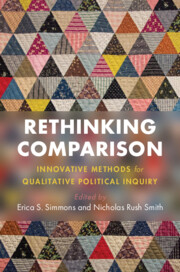Book contents
- Frontmatter
- Dedication
- Contents
- List of Figures
- List of Tables
- List of Contributors
- Acknowledgments
- 1 Rethinking Comparison: An Introduction
- Part I Rethinking the Building Blocks of Comparison
- Part II Developing New Approaches to Comparison through Research
- 7 Comparing Complex Cases Using Archival Research
- 8 Composing Comparisons: Studying Configurations of Relations in Social Network Research
- 9 Against Methodological Nationalism: Seeing Comparisons as Encompassing through the Arab Uprisings
- 10 Comparative Analysis for Theory Development
- 11 Problems and Possibilities of Comparison across Regime Types: Examples Involving China
- 12 Comparisons with an Ethnographic Sensibility: Studies of Protest and Vigilantism
- Theory and Imagination in Comparative Politics: An Interview with Lisa Wedeen
- Index
9 - Against Methodological Nationalism: Seeing Comparisons as Encompassing through the Arab Uprisings
from Part II - Developing New Approaches to Comparison through Research
Published online by Cambridge University Press: 24 September 2021
- Frontmatter
- Dedication
- Contents
- List of Figures
- List of Tables
- List of Contributors
- Acknowledgments
- 1 Rethinking Comparison: An Introduction
- Part I Rethinking the Building Blocks of Comparison
- Part II Developing New Approaches to Comparison through Research
- 7 Comparing Complex Cases Using Archival Research
- 8 Composing Comparisons: Studying Configurations of Relations in Social Network Research
- 9 Against Methodological Nationalism: Seeing Comparisons as Encompassing through the Arab Uprisings
- 10 Comparative Analysis for Theory Development
- 11 Problems and Possibilities of Comparison across Regime Types: Examples Involving China
- 12 Comparisons with an Ethnographic Sensibility: Studies of Protest and Vigilantism
- Theory and Imagination in Comparative Politics: An Interview with Lisa Wedeen
- Index
Summary
Given the relative dominance of positivist epistemologies in political science, the most common mode of comparison is that of variation finding. Although such models can take many forms, the objective is to identify what factors or variables differ across the cases as a means to explain that variation. But other modes of comparative analysis are available. In particular, Charles Tilly’s notion of encompassing comparisons – examining similarities and differences across cases while recognizing that they are inextricably connected or related to some larger whole – may be a better model for explaining long-term political processes, such as state formation, colonialism, capitalism, or even the spread of massive protests across a large number of cases. In this chapter, I develop an encompassing comparison of the Arab uprisings. The approach does not see the uprisings as individual cases whose diverse outcomes yearn for explanation but rather as instances of mass resistance to larger, transnational processes, notably including securitization and neoliberalism. This is not to suggest that these processes caused the uprisings. But the idea is to explore the ways in which the different governments were connected to these larger processes and networks and the extent to which those supranational factors help explain the outcomes of the individual cases.
Keywords
- Type
- Chapter
- Information
- Rethinking ComparisonInnovative Methods for Qualitative Political Inquiry, pp. 172 - 189Publisher: Cambridge University PressPrint publication year: 2021
- 3
- Cited by



